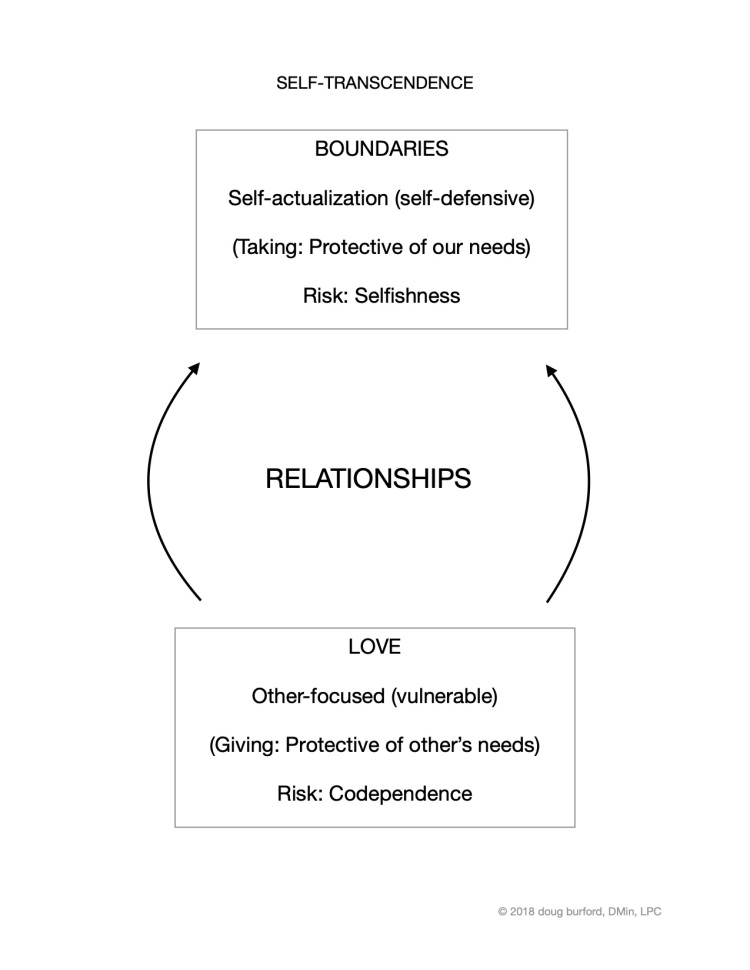
Relationships live in the constant dynamic tension between wanting our own way in pursuit of a self-actualized life, and yielding to others from other-centered love. Imbalance in either direction brings problems for oneself and for those with whom we are in relationship. The key is a balance of protection of self and protection of other(s). The ideal relationship is one of mutual giving, so that neither is forced to take from the other. Abraham Maslow even came around to a perspective similar to this idea when late in life he began to identify an alternative apex to his famed Hierarchy of Needs. Near the end of his life, Maslow began to identify “Self-Transcendence” as the pinnacle of human pursuit rather than Self-Actualization. In pursuit of self-transcendence, we invest our lives in a way that transcends our own self-interest. This is the essence of love, which is other-centeredness.
To further explain the above illustration, our tendency is to pursue what we want and need; this is survival. Out of balance, however, such self-development and self-preservation can resort to taking what we need at the expense of others with whom we are in relationship; even becoming defensive (self-protective) against them. This self-protection, of course, is the opposite of protecting the other. In extreme imbalance, the risk here is selfishness. At the other end of the spectrum is love, centered upon and protective of the wants and needs of others with whom we are in relationship. This is the kind of love we see demonstrated in the love of a parent toward a child; it is selflessness that sacrifices sleep, the use of time and space, dietary choices, the layout of the home, and many other things for the sake of the child’s needs and development. Such other-preferential love is vulnerable because there is no guarantee of reciprocation. Indeed, children should not be expected to sacrificially protect parents in reciprocal ways; this payoff may come only with advanced age and inverted dependence. But in the case of a relationship on par, such as marriage, other-centered love is vulnerable because, in protecting the other’s needs, we do so without a net; there is no guarantee the other will lovingly protect our needs and interest.
Ideally, there is mutual love; mutual protection of one another, wherein the feelings, needs, wants and wishes of each partner are understood and protected by the other, alleviating both from having to act selfishly by taking what they need at the expense of the other. Instead, both give to each other what the other needs to have a life that is safe, secure, happy, self-actualized, and satisfying. Not that partners are the complete source of all these things for each other; that would suggest a god-complex, or the imposition of the same on the other. But such mutual, sacrificial giving is the essence of love, and even of solid friendship, which is the number one predictor of marital success, according to decades of research by The Gottman Institute.
The risk of other-centered love and a focus upon sacrificially giving to the other what they need is codependence, one aspect of which is losing oneself. Co-dependents lose their voice and even their identity in the life and needs of the other—to an extreme. That last caveat is important because one should not expect to enter into a relationship of marital oneness without adjustments. To live however we wish, making whatever decisions we like without any consultation or yielding, saying whatever we want to say in whatever way we want to say it, whenever we want to say it, and doing as we please regardless of its effect on others—that’s called living alone. In marriage, we adjust for the sake of the other and are thus changed for the better by other-centeredness; this in contrast to trying to change the other (presumably into a version of ourself). That’s a topic for another article.
Boundaries must be erected when our partner is not acting in other-centered, protective love. An extreme example of this would be domestic violence, where other-protective love is wholly absent. In this case, the abused spouse must erect boundaries of self-protection against violence and disrespect, making clear in words and actions what will not be tolerated. In less extreme cases, boundaries are best articulated as positive requests that cast a vision for what is wanted, rather than criticisms of what was disappointing. For example, “I love getting all the house chores done before Sunday, so we have the whole day just to rest and play.”
Lastly, returning to self-transcendence—Abraham Maslow’s late reflection on the essence of human needs—it seems to me that this brings the whole illustration full-circle. self-transcendence is a paradox. It is the pursuit of something meaningful that is beyond our self. Yet, investing in it brings self-fulfillment. Examples are patriotism, altruism, parenting, and giving of ourselves and our means—even perhaps to the point of sacrificing our very lives—for something we so believe in that it is worth it. My father exemplified that self-transcendence in giving his life in armed combat against Communism in Vietnam. Missionaries and organ donors and teachers and others who give of themselves in ways that bring no fame or riches will testify to the same intangible sense of meaning derived from such altruism. So, we’ve come full circle. To reach self-transcendence—the apex of our needs—is paradoxically achieved by selflessness… sacrificing ourselves for something more important than self. Our goal in marriage is a relationship where we can love vulnerably without having to erect self-protective boundaries, nor lose ourselves to the self-centeredness of the other, because both are living sacrificially in other-centered, protective love.